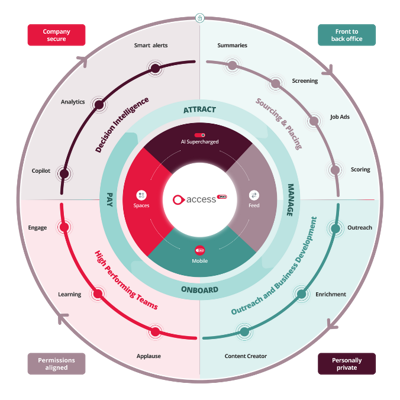Unleash the true power of your recruitment tech stack with Access Vincere Evo
Stop juggling disconnected tools and drowning in admin. Powered by Access Recruitment, our RecOS (Recruitment Operating System) unifies every stage of the recruitment lifecycle into one seamless platform.
With Access Vincere Evo, the AI engine that makes your agents work 2x faste, you get a fully connected suite: CRM/ATS, background checks, screening, websites, pay & bill, analytics, and automation. Everything flows, everything talks, and your recruiters stay focused on what they do best: placing top talent, faster.
Attract. Manage. Automate. Onboard. Pay. All within RecOS.

Recognised by leaders, loved by 22,000+ recruiters
Build your recruitment stack with AI at the core
Whether you're scaling, expanding, or just starting out, your recruitment operating system should grow with you. Access Vincere Evo gives you complete control—unifying CRM, ATS, onboarding, analytics, comms, pay & bill, and more into one powerful AI-powered hub.
At the heart of RecOS is our intuitive CRM/ATS, purpose-built for recruitment. And with Access Vincere Evo working quietly behind the scenes, your team moves 2x faster across every workflow, from candidate sourcing to final invoice.
The future is faster, smarter, and limitless with Access Vincere Evo
Imagine if your recruitment tech could do more than just store data—what if it could think, learn, and act alongside your team? Access Vincere Evo is your AI-powered growth engine that automates the admin, surfaces insights in seconds, and helps your consultants focus on what really matters: making more placements and scaling your business.
- Automate the busywork, instantly
- Match smarter, place faster
- Real-time coaching, real results
- Hire faster, with less admin
- Scale up, with one simple system
How agencies like yours win with Access Vincere Evo
Boost in placements and productivity
Boost in placements and productivity
Access Vincere Evo powers every part of your Recruitment Operating System, helping agencies move faster, automate more, and scale without limits. From CRM to compliance, you get one connected system that works twice as hard, so your recruiters don’t have to.







